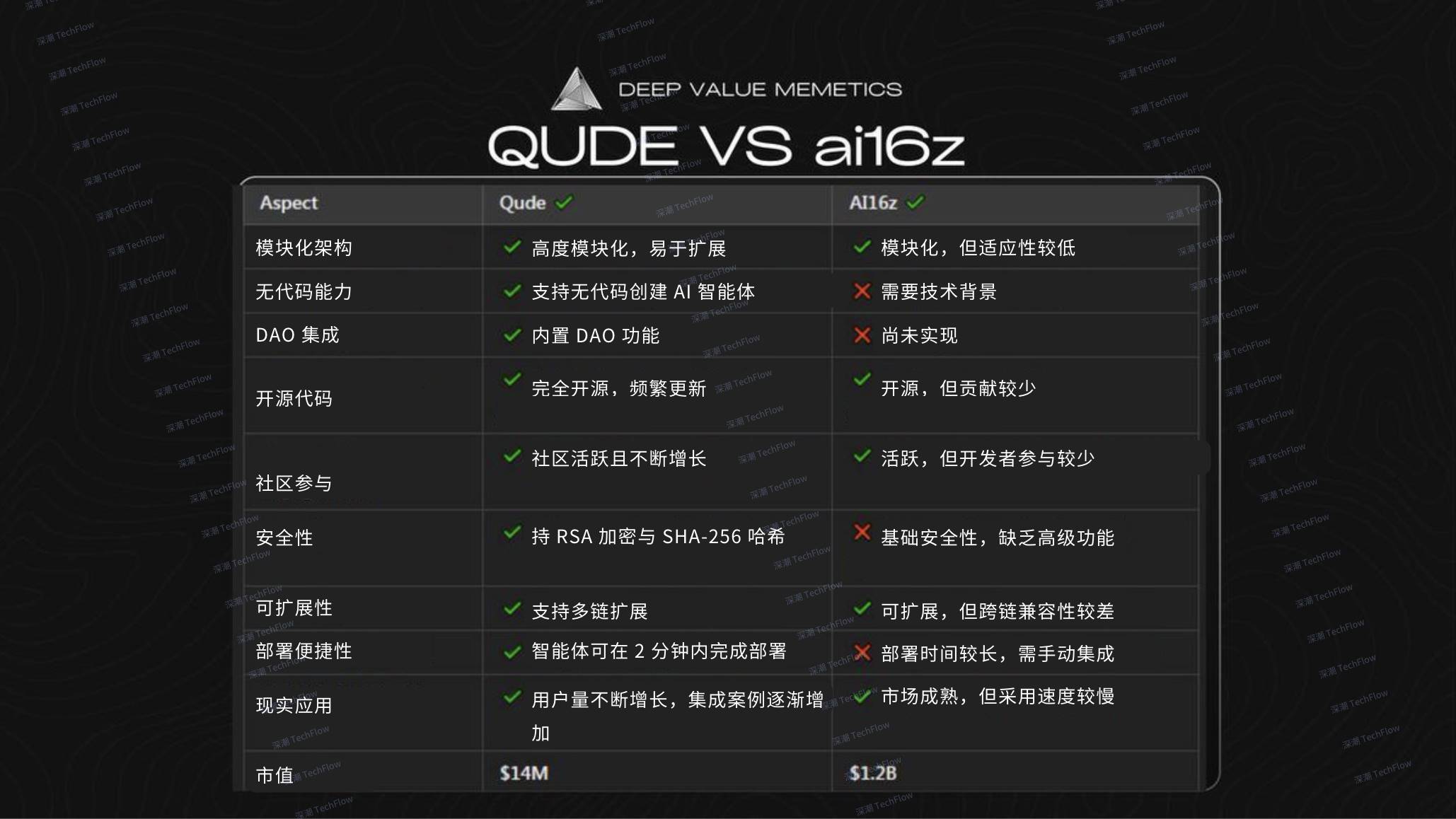QudeAI is an open-source framework designed for creating, deploying, and interacting with AI agents on the Solana network.
Author: Deep Value Memetics
Compiled by: Deep Tide TechFlow
$QUDE: The "Pioneer" of the Next-Generation Framework?
New Token Overview | $QUDE (FDV $30M) | @Qudeai
DVM Perspective: $QUDE is an open-source low-code platform and modular framework based on Solana ($SOL), focusing on simplifying the creation, deployment, and interaction processes of on-chain AI agents. It primarily addresses the complex challenges faced in developing scalable, secure, and data-analytical AI applications in a decentralized environment. As a new project, $QUDE has shown remarkable performance on GitHub, gaining 32 stars and 7 forks within two weeks. We believe this technology is unique within the Solana ecosystem, with almost no direct competitors. In the short term, its valuation may fluctuate between $50M-$100M; if adoption accelerates, its valuation may gradually approach that of other mature frameworks.
Project Overview | Modular, Scalable Agent Framework and Its DAO
QudeAI is an open-source framework designed for creating, deploying, and interacting with AI agents on the Solana network.
Through this framework, users can develop agents that perform tasks such as executing blockchain queries and market analysis, while QudeAI acts as a "co-pilot," providing guidance and collaborative support throughout the development process.
This framework is known for its modular and scalable design, enabling seamless integration of AI and blockchain technology.
Additionally, the QudeAI framework is tied to a decentralized autonomous organization (DAO). The DAO aggregates the market value of all agents deployed through the framework, and developers can choose to contribute a portion of the token supply to the DAO, gaining additional benefits such as agent validation and increased visibility.
How Does the Project Work? | CLI-Based Agent Creation, RESTful API Interaction, OpenAI-Driven AI Engine, and Firebase-Solana Data Management
Agent Creation and Deployment: Users define the behavior and functionality of AI agents through a command-line interface (CLI). The QudeAI framework provides comprehensive guidance to help users quickly complete the design and development of agents. Subsequently, agents can be deployed to the Solana blockchain via CLI commands.
Agent Interaction: Users can interact with agents through CLI tools or RESTful APIs. The RESTful API supports GET and POST requests, allowing users to query blockchain data or execute commands using natural language.
AI Engine: QudeAI utilizes OpenAI's API to drive the interaction capabilities of agents, allowing users to flexibly configure the behavior patterns and response logic of agents to meet various task requirements.
Data Management: Metadata and real-time data updates are supported by Firebase, while blockchain data is managed through the Bitquery API and stored on the Solana network, ensuring data transparency and immutability.
What Core Technologies Does the Project Use? Solana, Node.js Backend, OpenAI AI, Firebase Data Management, and Bitquery Analytics
Blockchain: Based on the Solana blockchain, providing high-speed, low-cost transaction capabilities while ensuring data transparency and immutability.
Backend: Built using Node.js and the Express framework for API routing, combined with Firebase for data persistence, and providing convenient interaction through RESTful APIs.
Artificial Intelligence: Utilizes OpenAI's GPT model to support natural language interaction and behavior configuration of agents.
Database: Firebase is used to store metadata and user interaction logs of agents, with real-time data updates.
API Integration: Bitquery provides blockchain data analysis services, and QudeAPI connects public AI agents to extend functionality.
Development Tools: TypeScript is used to enhance development efficiency, while CLI tools facilitate developers in managing the lifecycle of agents.
Middleware: Ensures secure communication and request coordination between various modules in the system.
What Key Problems Does the Project Solve?
The core goal of QudeAI is to address the pain points in the integration of AI and blockchain technology, providing developers and users with simpler and more efficient solutions:
Simplifying Complexity: Significantly reduces the technical barriers to developing and managing AI agents that interact with blockchain, helping developers focus on the core functionalities of the agents.
Enhancing Accessibility: As an open-source project, QudeAI provides a developer-friendly platform, enabling more people to easily utilize AI and blockchain technology.
Improving Performance and Scalability: Supports large-scale deployment and rapid response through efficient data processing and the integration of blockchain technology.
Ensuring Transparency and Security: Utilizes the immutability of blockchain to guarantee data integrity while providing secure storage solutions through Firebase.
Founders and Vision
Currently, the identities of QudeAI's founders have not been disclosed. However, the core vision of the project is to revolutionize the interaction between AI and blockchain technology by providing easy-to-use tools that simplify the creation and management processes of agents. QudeAI aims to promote the adoption of AI and blockchain technology, enabling more developers to easily build intelligent decentralized applications.
Comparison with Solana Native Frameworks
ARC's Rig Framework (@arcdotfun) and QUDE (@Qudeai) target different application domains.
$ARC's Rig Framework is a framework based on the Rust programming language, focusing on building high-performance AI agents. Its core goal is to optimize the performance and workflow of AI applications while addressing issues such as AI model integration, token management, and concurrent processing. By providing a range of practical tools, this framework helps developers enhance the operational efficiency of agents in real-world scenarios.
In contrast, $QUDE focuses on the deep integration of AI and blockchain, providing a platform where developers can directly create and run AI agents on the blockchain network. It supports on-chain intelligent interactions through QLLM (QudeAI Language and Logic Module) and promotes community collaboration through QCM (QudeAI Community Module), making agent development more open and user-friendly.
The core difference between the two lies in their focus: $ARC's Rig Framework primarily emphasizes performance optimization and workflow management of AI agents in the Rust environment, while $QUDE is dedicated to advancing the development and application of AI agents within the blockchain ecosystem.
References
Contract Address (CA): 3MyaQBG7y3SHLQZa282Jh2xtB2TZKHGzNp1CuZ4Cpump
Official Website: https://qude.ai
GitHub: https://github.com/qudeai
Developer Documentation: https://docs.qude.ai
Telegram Community: https://t.me/qudeai

Original image from Deep Value Memetics, compiled by Deep Tide TechFlow
免责声明:本文章仅代表作者个人观点,不代表本平台的立场和观点。本文章仅供信息分享,不构成对任何人的任何投资建议。用户与作者之间的任何争议,与本平台无关。如网页中刊载的文章或图片涉及侵权,请提供相关的权利证明和身份证明发送邮件到support@aicoin.com,本平台相关工作人员将会进行核查。



